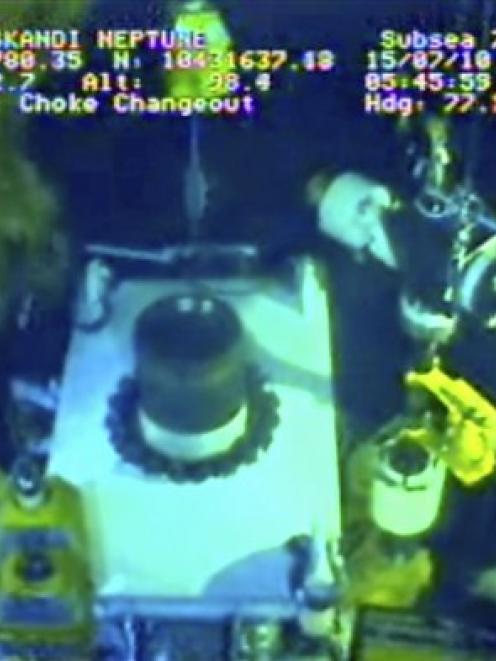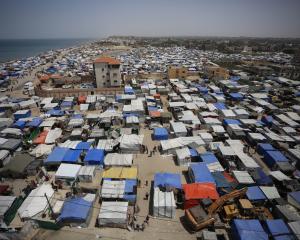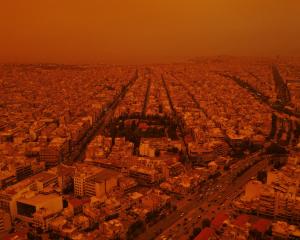
To the relief of millions of people along the Gulf Coast, the big, billowing brown cloud of crude at the bottom of the sea disappeared from the underwater video feed for the first time since the disaster began in April, as BP closed the last of three openings in the 75-ton cap lowered onto the well earlier this week.
But the company stopped far short of declaring victory over the biggest offshore oil spill in U.S. history and one of the nation's worst environmental disasters, a catastrophe that has killed wildlife and threatened the livelihoods of fishermen, restaurateurs, and oil industry workers from Texas to Florida.
Now begins a waiting period during which engineers will monitor pressure gauges and watch for signs of leaks elsewhere in the well. The biggest risk: Pressure from the oil gushing out of the ground could fracture the well and make the leak even worse.
"For the people living on the Gulf, I'm certainly not going to guess their emotions," BP vice president Kent Wells said. "I hope they're encouraged there's no oil going into the Gulf of Mexico. But we have to be careful. Depending on what the test shows us, we may need to open this well back up."
The news elicited joy mixed with skepticism from wary Gulf Coast residents following months of false starts, setbacks and failed attempts. Alabama Gov. Bob Riley's face lit up when he heard the oil flow had stopped.
"That's great. I think a lot of prayers were answered today," he said.
President Barack Obama called it a positive sign, but cautioned: "We're still in the testing phase."
The stoppage came 85 days, 16 hours and 25 minutes after the first report April 20 of an explosion on the BP-leased Deepwater Horizon oil rig that killed 11 workers. Somewhere between 94 million and 184 million gallons spilled into the Gulf, according to government estimates.
"Finally!" said Renee Brown, a school guidance counselor visiting Pensacola Beach, Fla., from London, Ky. "Honestly, I'm surprised that they haven't been able to do something sooner, though."
"I don't believe that. That's a lie. It's a (expletive) lie," said Stephon LaFrance, an oysterman in Louisiana's oil-stained Plaquemines Parish who has been out of work for weeks. "I don't believe they stopped that leak. BP's trying to make their self look good."
Wells said the oil stopped flowing into the water at 2:25 p.m. CDT after engineers gradually dialed down the amount of crude escaping through the last of three valves in the cap, an 18-foot-high metal stack of pipes and valves.
On the video feed, the violently churning cloud of oil and gas coming out of a narrow tube thinned, and tapered off. Suddenly, there were a few puffs of oil, surrounded by cloudy dispersant BP was pumping on top. Then, there was nothing.
"I am very pleased that there's no oil going into the Gulf of Mexico. In fact, I'm really excited there's no oil going into the Gulf of Mexico," Wells said.
The cap is designed to stop oil from flowing into the sea, either by bottling it up inside the well, or capturing it and piping it to ships on the surface. Retired Coast Guard Adm. Thad Allen, the Obama administration's point man on the disaster, said it is not yet clear which way the cap will be used. The answer could depend on the pressure readings over the next two days.
Even if it works, the cap is not a permanent fix, and not the end of the crisis by any means. BP is drilling two relief wells so it can pump mud and cement into the leaking well in hopes of plugging it permanently by mid-August. After that, the Gulf Coast faces a monumental cleanup and restoration that could take years.
BP stock, which has mainly tumbled since the spill began, closed nearly 8 percent higher on the New York Stock Exchange after the news.
Steve Shepard, Gulf Coast chairman of the Mississippi Chapter of the Sierra Club, said he was still skeptical about the news. "I think it's a little premature to say it's definitely over. They've gotten our hopes up so many times before that in my mind I don't think it's going to be over until Christmas."
Nine-year-old Lena Durden threw up her hands in jubilation when her mother told her the oil was stopped.
"God, that's wonderful," said Yvonne Durden, a Mobile-area native who now lives in Seattle and brought her daughter to the coast for a visit. "When came here so she could swim in the water and see it in case it's not here next time."
Randall Luthi, president of the Washington-based National Ocean Industries Association, a national trade group representing the offshore oil industry, said: "This is by far the best news we've heard in 86 days. You can bet that industry officials and their families are taking a big sigh here."












